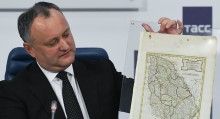Just as promised, the newly elected President of Moldova Igor Dodon’s first visit after taking office was to Moscow. Following talks with the Russian President Vladimir Putin, he made a lot of loud statements.
Firstly, he said that Moldova had gotten nothing from signing an Association Agreement with the EU, and it may well rescind the agreement depending on the result of its upcoming parliamentary election.
Secondly, he said that no Moldovan would dare to officially recognize occupied Crimea as Russian territory. “I have not changed my position and will not change it, but we must understand that we need friendly relations with Ukraine, as we need to solve the Transnistrian problem,” he said to explain this about-turn. Let us recall that during the election campaign, he clearly said that Crimea belonged to Russia.
Thirdly, the Moldovan president has promised to let all Russian TV channels back into the media space of his country.
“MOLDOVA IS COMING UNDER RUSSIAN GEOPOLITICAL CONTROL”
The Day asked program director of the Institute for Public Policy Oazu NANTOI to comment on the statements made by the Moldovan leader and the effects of rapprochement between Moldova and Russia.
“Moldova is a captive state. Igor Dodon has become the president that Vladimir Plahotniuc wanted. It seems that the two of them are playing out a very simple performance. Plahotniuc is positioned as a pro-European politician, and Dodon as a pro-Russian one. They will approach the next parliamentary election together. Meanwhile, the opposition will be destroyed by Plahotniuc. Ultimately, Plahotniuc will lose from implementation of the Association Agreement with the EU. Therefore, relations with the EU will be cooled to the freezing point. Then comes the ‘triumphant’ resolution of the Transnistrian conflict. I say it because Transnistria participated in the November 13 election, and we are told that people from there will join the projects aimed at a rapprochement with Russia. Overall, 15,000 to 16,000 people from Transnistria were brought to the right, Moldovan-controlled bank of the Dniester and ordered to vote for Dodon. We see a long game being played out here, which entails: a) the breakup of relations with the EU and b) the transformation of the Republic of Moldova into an offshore company for Plahotniuc and a plaything for Putin, another triumph of Putinism.”
Has Moldova’s agreement with the EU really brought it nothing?
“It is a lie. Dodon’s words are of no importance whatsoever.
“It is much more important to analyze closely what Putin said. His words were: we signed a Memorandum in 2003, and if the parties reach an agreement, Russia is ready to be a guarantor. In other words, the Transnistrian conflict in Moldova will be resolved, and Russia will be the guarantor of this resolution. In other words, Moldova will cease to be a sovereign state. It all refers to the Memorandum of Normalization of Relations between the Republic of Moldova and Transnistria of May 8, 1997, as well as the Kozak Memorandum. Russia’s position has not changed in the slightest. At the moment, as I understand it, there is a convergence of interests between Plahotniuc and Putin. And Dodon is just a mediator and a spokesman for Plahotniuc.”
How would you comment on Dodon’s promise to let Russian TV channels back into Moldova?
“Our media space is already saturated with Russian media. Dodon just wants to fully meet Putin’s demands.
“It is necessary to pay attention to the presence of the head of Gagauzia Irina Vlah in the Moldovan delegation as well. This sets the basis for federalization with three entities: Gagauzia, Transnistria, and the rest of the territory, as was outlined in the Kozak Memorandum of 2003. And it might set a precedent for the Donetsk and Luhansk regions too.”
You heard Dodon, who previously called Crimea Russian, stating in Moscow that no Moldovan would dare to officially recognize Crimea as Russian territory. What do you say to that?
“The thing is, Dodon said on TV after the start of the Russian aggression against Ukraine that the time had come for Moldova to get back its rightful territory now held by Ukraine. This statement can be found on the Internet. After the start of the election campaign, he answered a journalist’s question about who Crimea belonged to by saying ‘Russia.’ Then I organized a flash mob at the Ukrainian embassy: ‘We are sorry for Dodon, excuse us, please.’ Ukrainian politicians, regardless of their orientation, should now closely monitor what is happening in Moldova and understand the scenario, not just rely on out-of-context statements. And if I understand it correctly, the scenario is quite serious and long-lasting: Moldova turns into an offshore company for Plahotniuc and friends and comes under Russian geopolitical control, signifying another triumph of Putinism in a single small country.”
And what about Moldovan citizens, are they unable or unwilling to oppose such a scenario?
“The fact is that Dodon’s campaign appealed to the servile instincts of the former Soviet people. Meanwhile, the bulk of support for his opponent Maia Sandu came from people who are now intending to emigrate as well as the Moldovan diaspora in democratic countries. If this process does not get somehow blocked, the imbalance will grow, benefiting people who vote for their apples’ access to the Russian market and do not realize that they are burying the Moldovan statehood project.”








